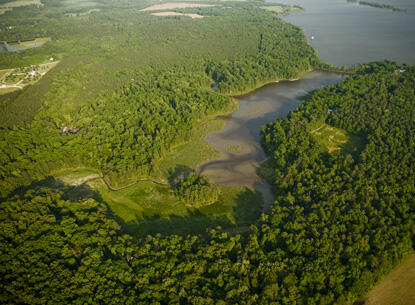
Oct. 4, 2010
Wetlands Restoration Project to Begin at VCU Rice Center
Share this story
The VCU Rice Center, a nearly 500-acre field station for environmental research on the historic James River, will soon be the site of one of the most significant wetland restorations on the East Coast.
A 70-acre artificial lake created in the 1920s to attract ducks for duck hunters will be drained, and VCU will team with The Nature Conservancy to create a blanket of native wetland vegetation where the lake once stood.
Kimages Creek, a stream that was blocked by the dam that created the lake, will flow freely again. That, in turn, will create a watery passage that will encourage the return of blueback herring and alewife, which once entered Kimages Creek to spawn before returning to the sea.
American eels – which Americans have both consumed and kept as pets -- are also expected to return.
Leonard Smock, Ph.D., director of the VCU Rice Center, said the wetland restoration project has been three years in the making. He anticipates that research at the site will blossom, as scientists from many disciplines, graduate students and others zero in on the wetland restoration.
“Forty years from now, this area will still be evolving …scientists and students will still be coming to study the wetland,” Smock said.
Greg Garman, Ph.D., director of the Center for Environmental Studies at the Rice Center, said that blueback herring and alewife once supported locally important commercial fisheries throughout the Virginia coastal region.
“But these populations have declined to critical levels over the past several decades, in large part to the construction of dams, like the one at the Rice Center, that block upstream migration for spawning,” Garman said.
The Virginia Aquatic Resources Trust Fund is paying the costs of removing the dam that blocks Kimages Creek and for replanting the wetland at the Rice Center.
Developers and others whose actions may impact a stream or wetland are given the option of paying into the trust, rather than creating new wetland of their own.
The trust is administered by the U.S. Army Corps of Engineers in a partnership with The Nature Conservancy in Virginia.
The Rice Center also will receive $455,000 from the trust fund stemming from a conservation easement on 217 acres of its property. The payment will go toward construction of a major research building on the site.
In addition, VCU will be paid by the trust to monitor the development of the wetland restoration over the next 10 years.
“Having this funding is very important in that it will allow us to establish long-term research projects studying the success of the wetland restoration,” Smock said.
Although the wetland restoration will have far-reaching and beneficial financial and research implications for the Rice Center, that’s not the most important objective.
“The main outcome of this project for me is that we’re doing the right thing for the environment,” Smock said.
Subscribe to VCU News
Subscribe to VCU News at newsletter.vcu.edu and receive a selection of stories, videos, photos, news clips and event listings in your inbox.







